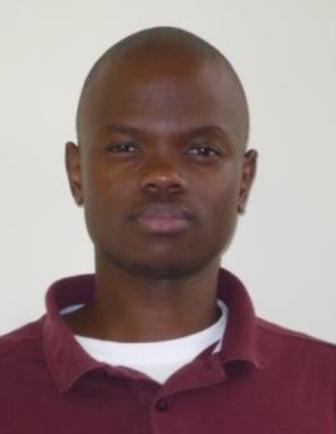All news
HPP to graduate four Masters and one PhD student in 2015
April 08, 2015
HPP is very proud to be graduating four Masters and one PhD student later this month. Congratulations on this achievement Kelly, Faatima, Phumzile, Michael and Mopo!!

|
| Kelly Pillay, Master of Medical Science Supervisor: Dr Michelle Gordon Thesis title: The impact of the p7/p1 gag cleavage site mutations on replication capacity and drug resistance in HIV-1 subtype C. Kelly’s Master’s study focused on the viral replication capacity and drug resistance in HIV-1 subtype C patients. The study had identified drug resistance mutations found in the gag region of patients failing 2nd line treatment regimen, in the absence of major protease mutations. Additionally, she had found the p7/p1 gag mutation, A431V, was found to significantly correlate with the protease mutations L10F, M46I, I54V, V82A and L76V. In her study she was able to demonstrate that the A431V mutation alone had a higher replication capacity to that of mutants containing protease mutations in a subtype C virus. Her study highlighted the significance of gag CS mutations in drug resistance and viral fitness, however she believes future studies will be required to improve our knowledge on the interaction between gag CS’s and PR during the development of drug resistance especially in HIV-1 subtype C. Kelly is currently a 1st year medical student at the University of KwaZulu-Natal, as well as a research intern. |
 | |
Faatima Laher, Master of Medical Science (Cum Laude) Supervisor: Dr Zaza Ndhlovu Thesis title: Mapping immunodominant patterns and HLA class II restriction characteristics of HIV-specific CD4+ T cell responses in acute and chronic HIV-1 subtype C infection. The focus of Faatima’s Master’s study was on the role of CD4+ T helper cells in the immune response to clade C HIV-1 infection. She tested the hypothesis that HIV-1-specific CD4+ T cell responses and protective class II HLA alleles are important determinants of effective immunological control of HIV-1 infection. The data identified immunodominant regions of HIV-specific CD4+ T cell responses and their association with viral control during clade C infection, highlighting a dominance of Gag and Nef targeting. In addition, high levels of epitope promiscuity was observed among class II HLA molecules, with the HLA-DRB1*13:01 allele variant in particular being associated with the highest frequency of responders in our cohort and restricting the highest number of HIV-specific peptides. Together, this information will be critical to vaccine efforts designed to induce these responses, as well as potential therapeutic manipulation of immunity in persons with acute and chronic HIV-1 infection. Faatima is currently a PhD student under the supervision of Dr Zaza Ndhlovu working on HIV-specific CD4 T cell responses in natural HIV infection. She joined the HIV Pathogenesis Programme after having completed her undergraduate and Honours degrees in Biological Sciences at UKZN (Pietermaritzburg). She has always had a keen interest in both human diseases and the impact they have on society. She decided to apply to HPP as it allowed her to bring these interests together. She is enthusiastic about translational medicine and would like to pursue this aspect of biomedical and public health research in the future. Inspired by the quote of Nelson Mandela that “Education is the most powerful weapon which you can use to change the world”, she would like to use her experience as a young researcher to teach and educate future aspiring scientists. |
 | |
Phumzile Khumalo, Master of Medical Science (Cum Laude) Supervisor: Dr Michelle Gordon Thesis title: Minority HIV-1 Drug Resistance Mutations in Patients Failing Highly Active Antiretroviral Therapy (HAART). The impact of minority variants related to drug resistance on clinical outcomes remains unresolved, although there is evidence that these variants can influence treatment efficacy. Phumzile’s Master’s study determined the minority variants in HIV-1 Pol that were not detected by standard genotyping in patients failing HAART. Her study illustrates the persistence of 1st line Non-Nucleoside Reverse Transcriptase inhibitors (NNRTIs) mutations even after the patients are switched to their 2nd line therapy, highlighting the importance of detecting minority variants in patients who have failed treatment to fully assess the spectrum of drug resistance mutations. Phumzile graduated with a BSc degree, majoring in Microbiology and Biochemistry, from UKZN. She then undertook postgraduate studies at UKZN Medical School and obtained an Honours degree in Medical Microbiology. Soon after completing her Honours degree she started her Masters degree in Virology at HPP under the supervision of Dr Michelle Gordon. Her Master’s degree was the continuation of her Honours project. Phumzile is currently working as a Research Assistant at HPP. Phumzile’s research interest is on HIV/AIDS in South Africa, specifically on HIV/ AIDS treatment. She plans to complete a PhD degree in the future which she believes is a solid foundation for progression into an academic career.
|
 | |
Michael Zulu, Master of Medical Science Supervisor: Dr Christina Thobakgale Thesis title: Dysregulation of Natural Killer (NK) cells in chronic clade C HIV-1 infection. Natural Killer (NK) cells are important mediators of the innate immune response against viruses and have been shown to play a very important role in the control of HIV-1 infection. However, HIV-1 evades NK cell antiviral functions by inducing a wide range of changes in NK cell phenotype and function. To assess mediators of NK cell dysfunction in HIV-1 chronic infection, Michael conducted a cross-sectional study examining the phenotype and function of NK cells based on Siglec-7, NKG2A, NKG2C and CD57 phenotypic expression using multicolour flow cytometry in HIV-1 subtype C chronically infected participants compared to healthy donors recruited from Durban, KwaZulu-Natal. Michael demonstrated that HIV-1 viremia induces the expansion of a pathologic CD56-CD16+ NK cell subset and also alters Siglec-7 and CD57 expression on NK cells of infected participants. These phenotypic changes induced by viremia may lead to functional dysregulation on NK cell subsets during chronic HIV-1 clade C infection and therefore viral escape from the NK cell antiviral functions. Michael first enrolled at UKZN in 2008 as a BSc (4-year augmented programme) student majoring in Biomedical Sciences. He completed this degree in 2011 and then went on to register for a BSc Honours degree in Biological Sciences in 2012 before joining the HIV Pathogenesis Programme as a Masters Student (MMedSc) in 2013 under the supervision of Dr Christina Thobakgale. Michael is currently a PhD student at the University of Cape Town, Faculty of Health Sciences, Institute of Infectious Diseases and Molecular Medicine, Division of Immunology under the supervision of Professor Clive Gray.
|

| |
Mopo Radebe, Doctor of Philosophy Supervisor: Professor Thumbi Ndung’u Thesis title: Patterns and features of HIV-1-specific CD8+ T-cell responses during acute HIV-1 infection and their association with viral control. Cytotoxic T cells play an important role in HIV immune control. This study identified the earliest cytotoxic T cell responses generated following HIV infection. The study found that responses directed at the HIV Gag protein are associated with viral control but show delayed appearance kinetics and do not always persist. Furthermore, most immune responses generated during acute HIV infection did not cause harmful mutations in HIV. This study provides a rational basis for the design of HIV vaccines.
|










